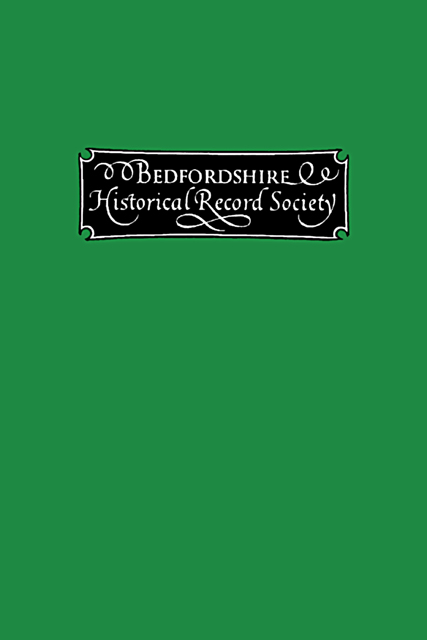Book contents
- Frontmatter
- Contents of Volume II
- Rules for Transcription
- Corrections and Additions to Volume i
- Frontispiece : Seal of Hugh de Beauchamp to face In Memoriam C. G. C
- The Bedfordshire Wills and Administrations proved at Lambeth Palace and in the Archdeaconry of Huntingdon
- The Beauchamps, Barons of Eaton
- Ancient Bedfordshire Deeds, No. I
- Records of Northill College, No. II.
- Bedfordshire Charters in the Missenden Cartulary
- The Browne Family of Arlesey
- Markets and Fairs of Luton
- The Assessment of Knight Service in Bedfordshire, No. I
- Materies Genealogica, No. I
- An Early Bedfordshire Taxation
- A Commutation of Villan Service
- Records of Knight Service in Bedfordshire
- Notes and Replies: —Ravensden and Chainhalle: G. H. F.—Toddington Place Names, 1453 : F. A. P-T.— Luton Names in the xiith Century : G. FI. F.—Duties on Bricks : H. S. Holt
- Index
An Early Bedfordshire Taxation
Published online by Cambridge University Press: 14 July 2023
- Frontmatter
- Contents of Volume II
- Rules for Transcription
- Corrections and Additions to Volume i
- Frontispiece : Seal of Hugh de Beauchamp to face In Memoriam C. G. C
- The Bedfordshire Wills and Administrations proved at Lambeth Palace and in the Archdeaconry of Huntingdon
- The Beauchamps, Barons of Eaton
- Ancient Bedfordshire Deeds, No. I
- Records of Northill College, No. II.
- Bedfordshire Charters in the Missenden Cartulary
- The Browne Family of Arlesey
- Markets and Fairs of Luton
- The Assessment of Knight Service in Bedfordshire, No. I
- Materies Genealogica, No. I
- An Early Bedfordshire Taxation
- A Commutation of Villan Service
- Records of Knight Service in Bedfordshire
- Notes and Replies: —Ravensden and Chainhalle: G. H. F.—Toddington Place Names, 1453 : F. A. P-T.— Luton Names in the xiith Century : G. FI. F.—Duties on Bricks : H. S. Holt
- Index
Summary
The document transcribed below is preserved in the Public Record Office. It is twofold in its interest, for not only does it form an important addition to early local history, but it also provides material of some value as throwing a sidelight on early administrative history. As may be gathered below, the document consists of three pieces of parchment; of which two, the writs, have been attached to the largest membrane at some date unknown, but comparatively recent. Of these three parchments two are closely related to each other, the writ of 31 July 21 Henry III, and the inquisition of 24 Henry III which is its return. It is mere accident, apparently, which has preserved the earlier writ of 20 May 21 Henry III where, technically speaking, it does not belong. At first sight the documents appear sufficiently confused in character; a writ of distraint for a tax of a fortieth in 1237 when no fortieth was levied, another writ, dated the same year demanding a copy of the returns of a carucage levied in 1220, and lastly the required copy dated more than two years later. The explanation appears to be that the mills of the Exchequer, though they ground exceeding small, were yet compelled by circumstances of local administration to grind slowly, and the known history of taxation at this period enables us to get a right perspective of our documents.
In 1232 a grant of a fortieth on all moveables was made to the Crown, and this was followed in 1237 by a further tax of a thirtieth. The business entailed in issuing the writs for the thirtieth must have emphasized the fact that the Bedfordshire returns had not yet been made in full for the taxation of 1232! Hence the peremptory writ, ‘venire facias,’ of 20 May 21 Henry III issued to the Sheriff of Bedfordshire and Buckinghamshire, directing him to send William de Bechamton’ the Bedfordshire collector, and John of Devon of the Giffard Honour, to the Exchequer to answer for arrears, and to distrain where necessary for such arrears. The returns made on the dorse of the writ state that John of Devon acting as Steward of the earl of Arundel had no lands in either county, in other words the Sheriff had no personal hold on him.
- Type
- Chapter
- Information
- The Publications of the Bedfordshire Historical Record Society , pp. 225 - 238Publisher: Boydell & BrewerFirst published in: 2023



